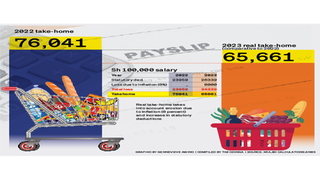
Business
Premium
Sh1,000 buying power dips to Sh850 in a year
What you need to know:
- Erosion in purchasing power due to increase in statutory deductions and inflation.
- Sh100, 000 earner has Sh10, 380 less
- Fuel that lasted a week now lasts four days
A Kenyan who had Sh1,000 note to spend in October last year can only buy goods worth Sh850 today due to inflation, a weakening currency, and taxes among other factors that have conspired to erode the buying power of the shilling.
Though inflation in the period has remained at 8.0 percent on average, an analysis by the Business Daily shows that Kenyans have lost nearly 15 percent of their take-homes when all taxes and deductions are computed.
The weakening purchasing power has hit household budgets hard, with the poor bearing the biggest brunt, due to slower growth in wages.
For instance, Kenyan workers earning Sh50,000 monthly and below have lost at least 13 percent of their purchasing power, due to a combination of factors that include new government deductions and a sustained rise in the cost of living.
The analysis shows that the erosion of purchasing power is spread across different walks of life. Those earning Sh100,000 and high earners from Sh600,000 have seen their net incomes eroded by 13.65 percent and 14.3 percent respectively.
The effect of the eight percent inflation, also worsened by the depreciation of the Kenya shilling and new deductions, is the loss of about Sh5,630 from a Sh50,000 salary, while that of a Sh100,000 salary has about Sh10,380 less to spend today. To cope, some Kenyans are buying smaller portions of products whose prices are up, a situation that has caught Kenyans across different sectors, from doctors, teachers and those in the manufacturing sector.
For instance, Mercy Njoki, a teacher based in Nairobi, has found herself increasingly making adjustments in her lifestyle, including better timings when shopping and even switching markets to get cheaper products, to save as much as she can.
Her household budget has risen to about Sh7,000 from Sh5,000. Her motorcycle rider (boda boda) who charged Sh50 for a one-way trip to/from school has since increased the fare to Sh70. Whenever she has to use a vehicle to run day-to-day errands, the regular amount of fuel now takes her four to five days where it would previously be sufficient for a week for the same amount of money.
“This has reduced my frequency of going home. Sh2,000 fuel would take me for a week running day-to-day errands, but now fueling Sh2,000 takes me about four or five days,” Ms Njoki says. “We had a salary increment of about Sh3,000 in July, but that only served to cushion against the impact I could have had due to the introduction of the housing levy. It was just a plus one, minus one since the pay-as-you-earn (PAYE) tax increase. Overall, I feel I’m earning Sh2,000 less than I used to earn even with the salary increase.”
While at income level the July salary rise may have served to cushion part of the income shocks due to increased statutory levies, Ms Njoki, however, observes that it’s at the spending where she has been feeling much impact.
She has to contend with the reality of high prices of goods and services, at the supermarket, at the food markets and even when travelling.
“Previously, with Sh1,000 I could get 62 tokens (of electricity), now I am getting 48 tokens. My electricity bills have gone high. I’ve had to reallocate some of my money when it comes to expenditures at home and even shopping when there are offers, going to the market for groceries. By doing that it doesn’t mean that my expenditure has gone down, it’s only that I’m cushioning myself against spending more where it’s not needed,” the teacher says.
On the income end, increased and new statutory deductions this year, which include the National Social Security Fund (NSSF), Housing Levy and PAYE for some workers, have left employees’ take-home smaller.
And on the expenditure side, the rising commodity prices owing to factors such as increases in costs of production, global supply chain shocks and foreign exchange vulnerabilities have left consumers spending more for the same items.
A worker who has been earning Sh50,000 since last year has lost Sh5,630 (13.55 percent) from their take-home pay, due to inflation and the salary deductions alone. A worker earning Sh100,000 now has to make do with Sh10,380 less, as inflation eats Sh8,000 in the high commodity prices when paying the bills, and statutory deductions up by Sh2,380.
This is because inflation averaged eight percent in the first nine months of 2023, while statutory deductions have been applied at the rate of 1.5 percent on salary for Housing Levy (since July), and six percent for the NSSF since February from Sh200.
Trade unions have sounded the alarm that all is not well, noting that while businesses have an opportunity to adjust prices when costs go up, workers are left vulnerable. They are now seeking an audience with the President to address the issue.
“We don’t want to take our people to the streets before we enter into dialogue (with the government). We need to compare notes where we are going and see how we can go about it. Whatever goes up, employers and businesses will be able to adjust up prices of their products, which are consumed by workers and workers have no opportunity to adjust their salaries,” Central Organisation of Trade Unions secretary-general Francis Atwoli said last week.




